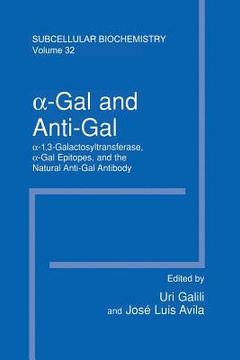Share
α-Gal and Anti-Gal: α1,3-Galactosyltransferase, α-Gal Epitopes, and the Natural Anti-Gal Antibody Subcellular Biochemistry
Galili, Uri ; Avila, José-Luis (Author)
·
Springer
· Paperback
α-Gal and Anti-Gal: α1,3-Galactosyltransferase, α-Gal Epitopes, and the Natural Anti-Gal Antibody Subcellular Biochemistry - Galili, Uri ; Avila, José-Luis
Choose the list to add your product or create one New List
✓ Product added successfully to the Wishlist.
Go to My Wishlists
Origin: U.S.A.
(Import costs included in the price)
It will be shipped from our warehouse between
Monday, July 22 and
Wednesday, August 07.
You will receive it anywhere in United Kingdom between 1 and 3 business days after shipment.
Synopsis "α-Gal and Anti-Gal: α1,3-Galactosyltransferase, α-Gal Epitopes, and the Natural Anti-Gal Antibody Subcellular Biochemistry"
It has been 15 years since the first report on the isolation of anti-Gal from human serum and the demonstration that this antibody is the most prevalent antibody in humans (Galili et al., ]. Exp. Med. 160: 1519, 1984). Subsequent interdisciplinary studies in immunology, carbohydrate biochemistry, molecular biology, and evo- lution demonstrated the highly restricted specificity of anti-Gal for the carbohy- drate epitope Gal al-3Galpl-4GIcNAc-R, (termed here the a-gal epitope), the unprecedented evolutionary pattern of distribution of a-gal and anti-Gal in mam- mals, and explained the evolution of this antigen and antibody by analysis of the a 1,3galactosyltransferase gene, the gene that encodes the enzyme that synthesizes the a-gal epitope. These studies have suggested that a major selection process that occurred in the course of evolution of ancestral Old World primates resulted in the inactivation of the a1,3galactosyltransferase gene and the subsequent appearance of anti-Gal in these primates. Other studies in immunoparasitology have demon- strated the possible physiologic significance of anti-Gal in protection against cer- tain parasitic infections. Major scientific attention was focused on a-gal and anti-Gal with the real- ization in the early nineties that the interaction between this antigen and antibody is the major obstacle to xenotransplantation. The success of immunosuppressive drugs, in the last two decades of the 20th century, in preventing allograft rejection, has raised hopes for cure in many patients in need of organ transplant. Because of limited supply of allografts, only 20% of patients receive the needed organ.

